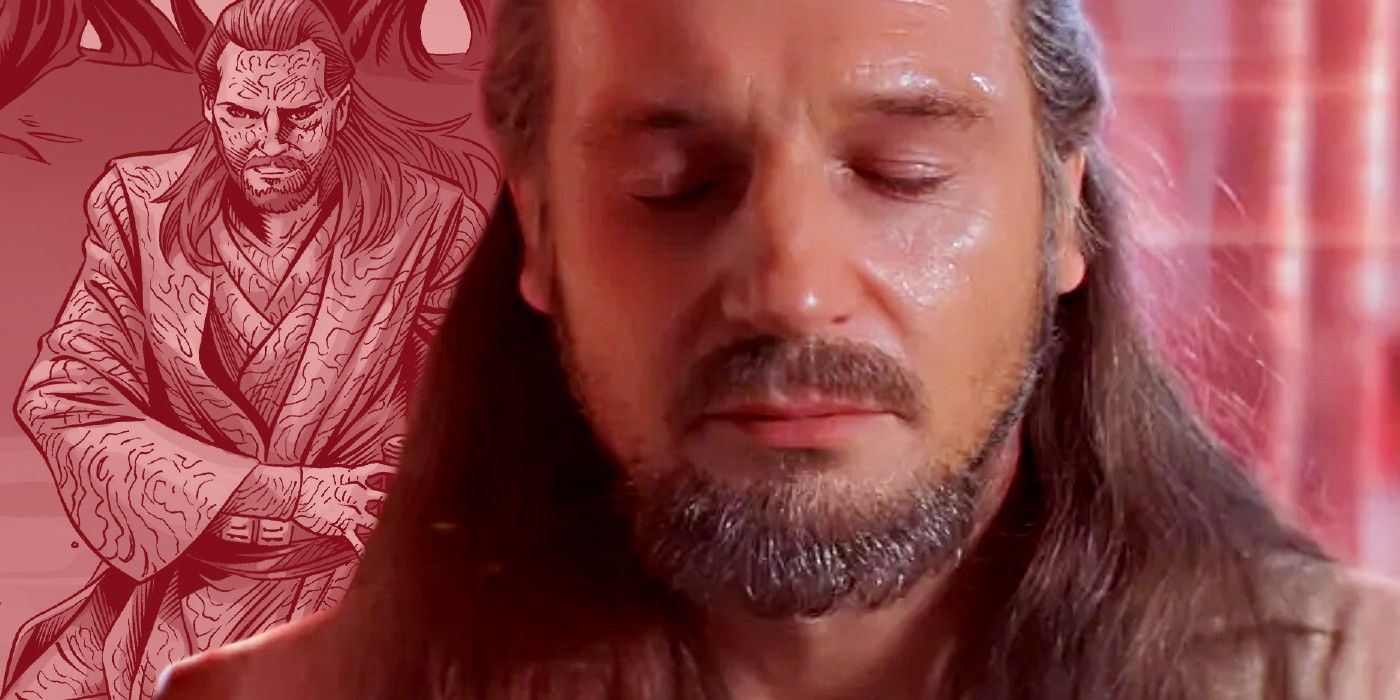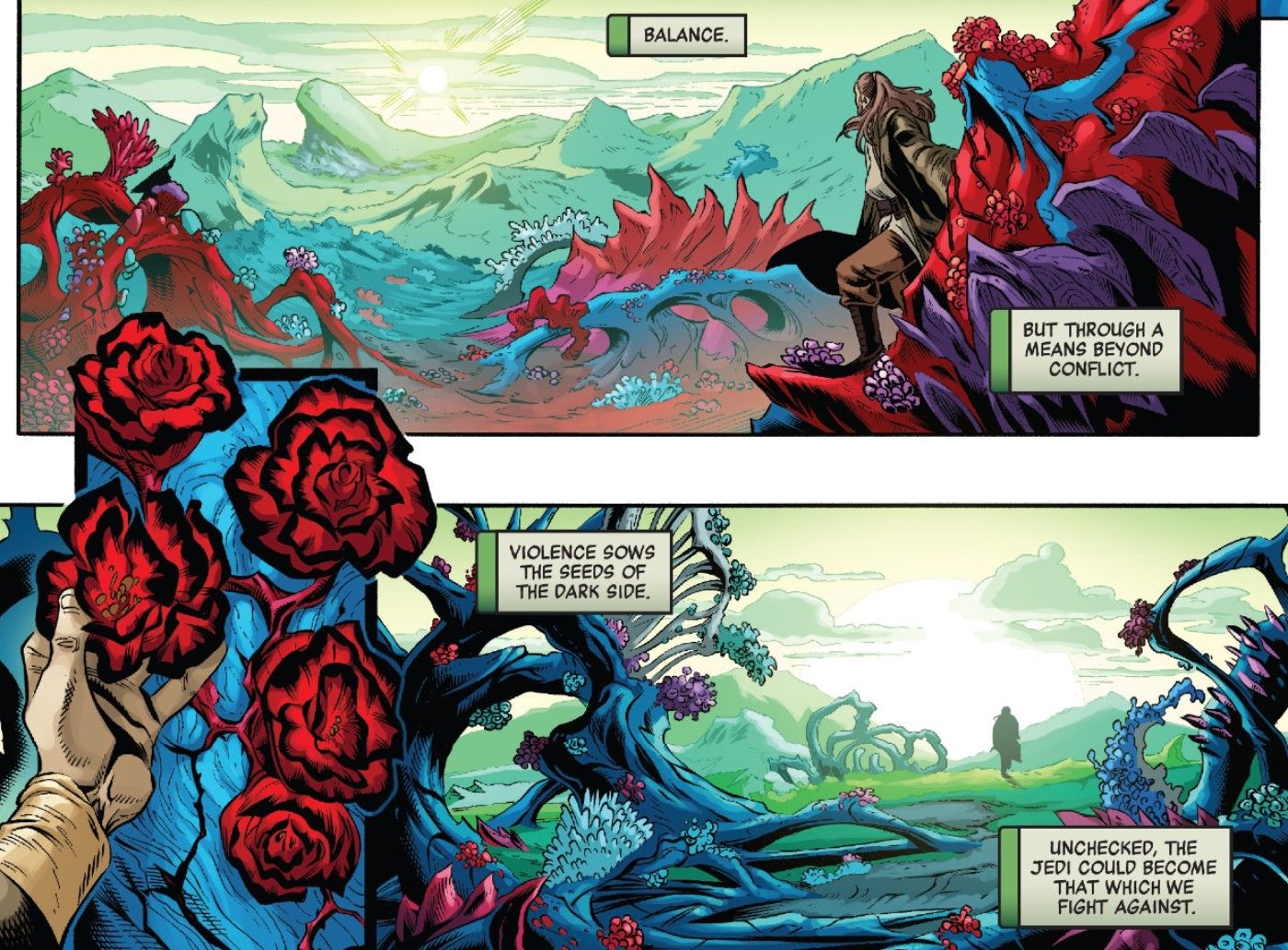
Refusing to be blinded by Coruscant's politics, the Star Wars comic series Age of the Republic emphasizes how Qui-Gon Jinn represents the best of the Order. If there were more Jedi who followed his moral philosophy and acted as guardians of peace rather than warriors, it's clear the Sith's return under Emperor Palpatine would have been impossible.
In Star Wars: Age of Republic - Qui-Gon Jinn (2018) #1, Qui-Gon is on a planet called Br'in defending the Priestess of Wood from blaster fire. When surrounded, the priestess refers to Qui-Gon as a mighty "Jedi Warrior," which Qui-Gon corrects by saying he "was sent to find a peaceful solution" rather than fight. Upon their escape to Coruscant, Qui-Gon voices his inquisitive concerns about the Jedi's purpose to Grandmaster Yoda.
When Qui-Gon speaks with Yoda, he says the Jedi "are seen as soldiers. Servants of politicians. With little mention of the Force itself." He explains, "Perhaps the Jedi Council residing in Coruscant is part of the problem. The Jedi are used as a weapon of the Republic and are seen as such. Perhaps even by Jedis themselves." He concludes his opinion by believing "there is a loss of vision." To find answers, Qui-Gon travels to a planet filled with greenery and receives a vision through the Force. Qui-Gon's understanding reveals itself when he proclaims, "violence sows the seeds of the dark side. Unchecked, the Jedi could become that which they fight against." The issue ends with Qui-Gon telling Yoda, "What is the Jedi's purpose if not balance?" The issue comes from Jody Houser and Cory Smith.

Qui-Gon's prophetic vision in Age of Republic and his discussions with Yoda emphasize how he is the best of the Jedi because he openly questions the Council's decisions and is open to unusual solutions to find balance (part of the reason why he wasn't on the Council). When Darth Maul killed Qui-Gon, he slew perhaps the most influential Jedi offering an alternative to the blinkered view with made the Order so vulnerable to Palpatine's machinations.
By referring to the Jedi as "soldiers" and "servants of politicians," Qui-Gon suggests that the Jedi are servicemen who perform duties for a foreign body, like the Republic, rather than focusing on their internal service to the galaxy for the Jedi Order. Furthermore, Qui-Gon mentions that the Council's location on Coruscant may be part of the issue because of their proximity to the Senate (which acted as the Sith's tool of manipulation), hence why he believes the Jedi have lost their way. When he concludes that the "Jedi could become that which they fight against" by becoming violent warriors, the comic implies how Qui-Gon's connection to the Force and desire for balance is why he sees the Jedi's corruption. Even when he tries to tell Yoda, who disagrees, Qui-Gon still believes the Jedi's purpose should be to find balance, but they can't because the Senate is influencing them (and, unbeknownst to him, the Senate is controlled by the Sith.)
Star Wars: Age of Republic - Qui-Gon Jinn (2018) #1 supports the notion that the Jedi are galactic failures because they were unaware of how strong the Republic's influence was on the Council. However, Qui-Gon's moral greyness and connection to the Force are what saved him from being blinded by corruption. Even though Qui-Gon was unaware that the Sith were gaining power and influence in the Senate, his keen awareness of the unfolding situation would have made him their worst nightmare. Star Wars shows how their success relied on the Jedi being unaware and rigidly set in their way, but had Qui-Gon Jinn survived, it's likely his direct action and counsel to Yoda would have stopped them walking into Palpatine's Sith trap.
Comments
Post a Comment